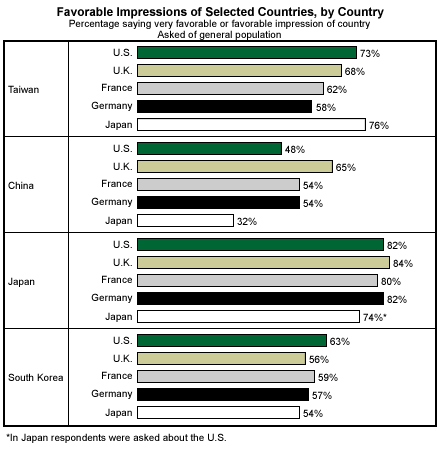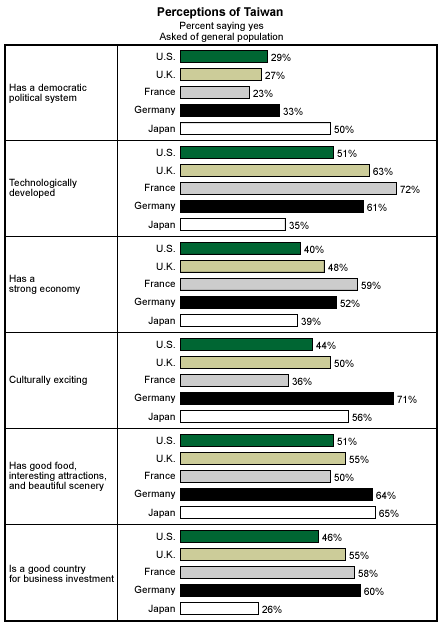"Made in Taiwan" is a label recognized around the world; for decades, Taiwan has been a leading exporter of products from bicycles to consumer electronics. If results from a multinational ║┌┴¤═° study* conducted for the Taipei Economic and Cultural Office are any indication, then the state's strong participation in the global economy may have helped foster considerable goodwill worldwide toward the Taiwanese.
For the study, ║┌┴¤═° surveyed the general population and opinion leaders in the United States, Japan, the United Kingdom, France, and Germany. In each country, only minorities of the general population -- from 15% in France to 44% in the United States -- claim to know "some" or "a great deal" about Taiwan. Nevertheless, in each country, majorities have "very favorable" or "favorable" impressions of Taiwan. This is particularly the case in Japan (76% favorable), the United States (73% favorable), and the United Kingdom (68% favorable). On average, Taiwan receives higher favorability ratings in the five countries studied than those of China and South Korea, but lower than those of Japan.

In each country, the 200 opinion leaders -- which included leaders in religion, labor groups, government, academics, business, and media organizations -- were both significantly more likely than the general public to know something about Taiwan and view it favorably. Among Japanese and U.S. opinion leaders, more than 9 in 10 say they have a very favorable or favorable impression of Taiwan.
Citizens in the five nations surveyed are most likely to say media sources such as television, newspapers, and magazines have provided them with information about Taiwan. However, many in each country, including 68% in the United Kingdom, 58% in France, and 54% in the United States, say they've learned about Taiwan through its goods.
Politics and Economics
Could the contrast between democratic Taiwan and communist China be fueling positivity toward Taiwan? Based on these data, it doesn't seem likely. Just 29% of Americans are even aware that Taiwan has a democratic political system. The results are similar in the United Kingdom (27%), France (23%), and Germany (33%). On average, given a list of attributes they might associate with Taiwan, respondents in the five countries are most likely to agree Taiwan is "technologically developed" and "has good food, interesting attractions, and beautiful scenery."

The opinion leaders in each country were more likely than the general public to be aware of Taiwan's democratic status, particularly those in Japan (73%) and the United States (68%). The opinion leaders were also considerably more likely to say Taiwan is technologically developed, economically strong, and a good place for business development.
Bottom Line
The favorable impression Taiwan enjoys in these five countries -- particularly compared to that of China -- doesn't seem to be predicated by the awareness that Taiwan is politically democratic. In this era of economic globalization, public attitudes toward foreign countries may be increasingly shaped as much by their status as trading and business partners as by their political persuasion.
That may be good news for China's global reputation if it maintains consistent, responsible business standards during its ongoing emergence as an economic giant. But given Taiwan's healthier international image, any aggression toward the island by China will go a long way toward erasing any public opinion gains China's development is producing. Next week's article will look specifically at questions regarding the Taiwan-China situation, including what should be done if China were to attack Taiwan.
*For the general population study conducted in May and June 2005, results are based on the sample sizes of approximately 1,500 in each country are subject to an error attributable to sampling and other random effects of ┬▒3 percentage points at the 95% confidence level or the general population survey. In all cases, only one person from each household screened was included in the survey. Results based on the sample size of 200 opinion leaders are subject to an error attributable to sampling and other random effects of ┬▒8 percentage points. The sampling method and subsequent weighting procedures were designed to reinforce the projectability of the data.
